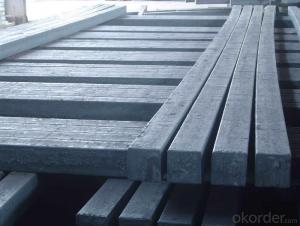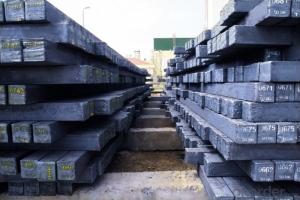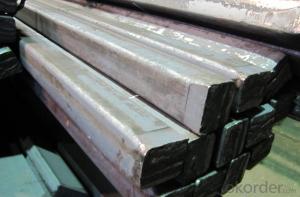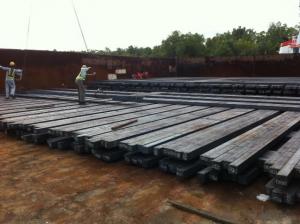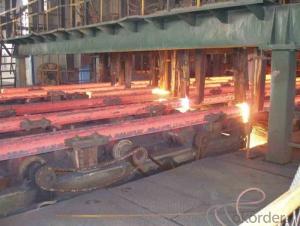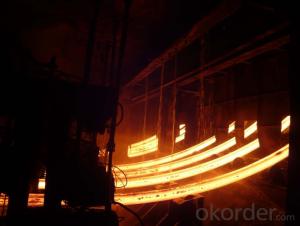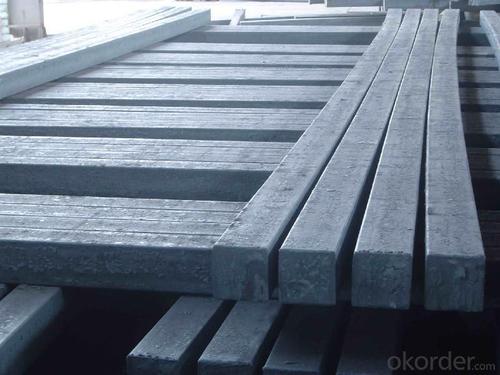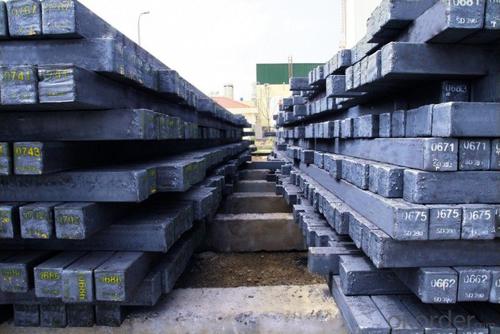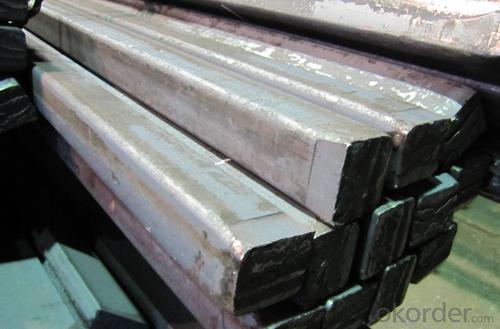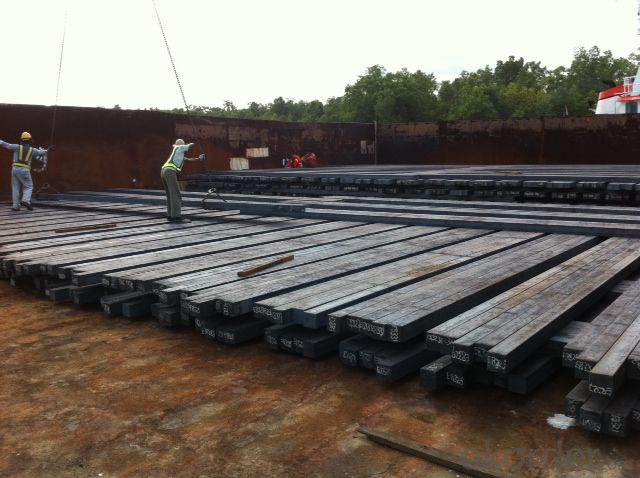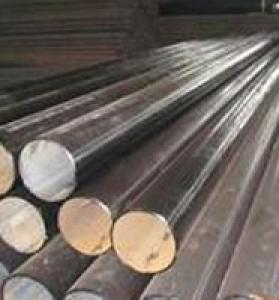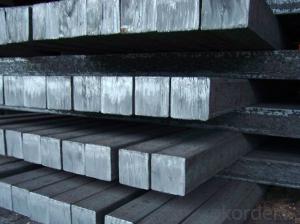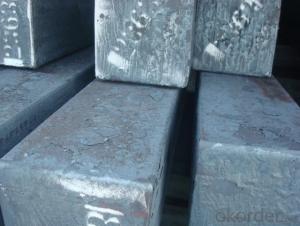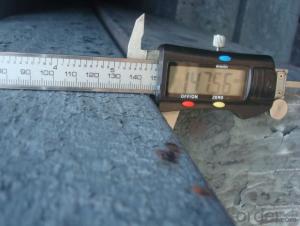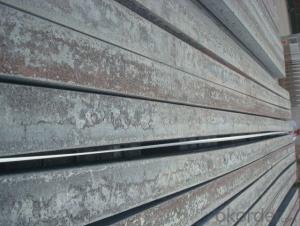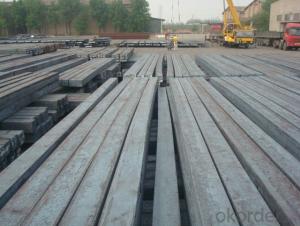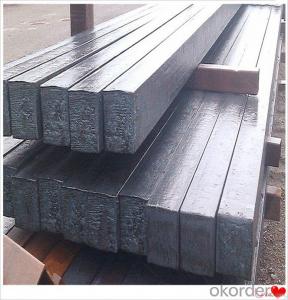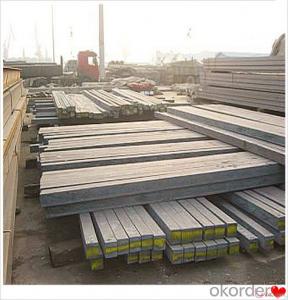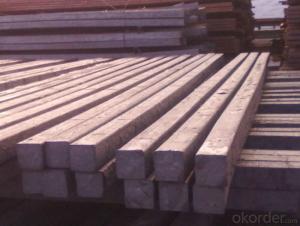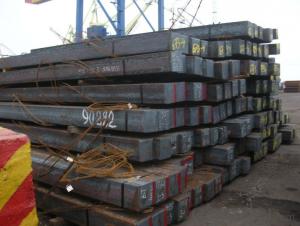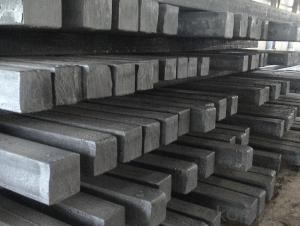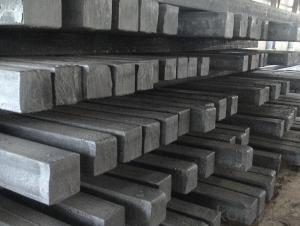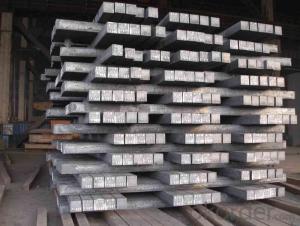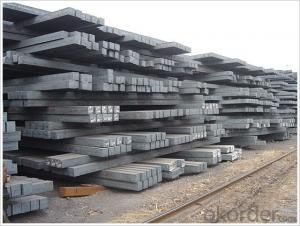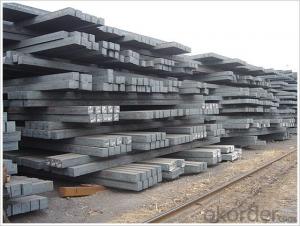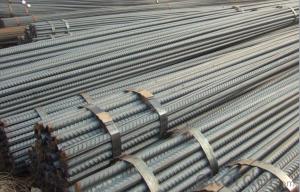Square Steel Billet Q235 3SP Grade Prime Quality 3#
- Loading Port:
- Tianjin
- Payment Terms:
- TT OR LC
- Min Order Qty:
- 2000 m.t
- Supply Capability:
- 50000 m.t/month
OKorder Service Pledge
OKorder Financial Service
You Might Also Like
Description of Square Steel Billet Q235 3SP Grade Prime Quality 3#
M. S. Billets are used for rolling of TMT Re-Bars of Fe415 and Fe500 Grade and various other structural steel products.
CRS Billets are used for rolling of CRS TMT Re-Bars.
Special Alloy Billets are used for rolling of any special grade TMT Re-Bars like Earthquake resistant TMT Re-Bars and for special grade structural steel products.
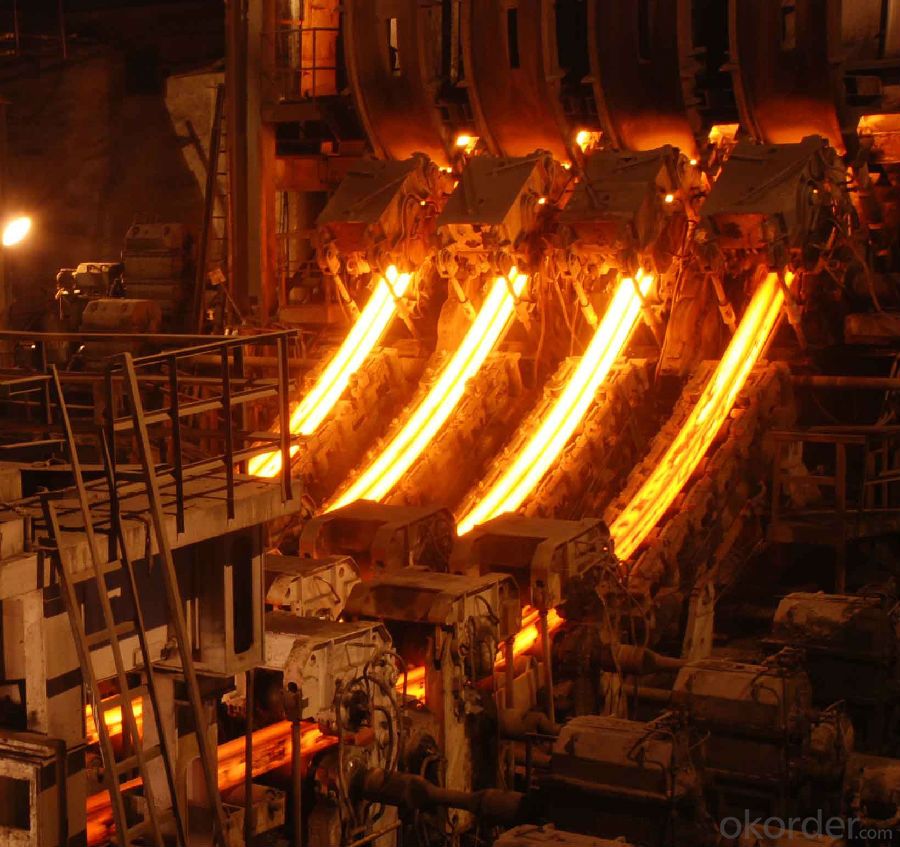
Main Feature Square Steel Billet Q235 3SP Grade Prime Quality 3#
Raw elements(C,Fe,Ni,Mn,Cr,Cu.)---Smelted ingots by AOD finery---hot rolled into black suface---pickling in acid liquid---cold drawn----polished by automatically machine--- cutting into pieces---checking quanlity
Applications of Square Steel Billet Q235 3SP Grade Prime Quality 3#
Widely Used in the areas such as Stainless Steel Fasteners, Chains, Kitchen and Sanitary wares, Furniture handles, Handrails, Electroplating and Electrolyzing pendants, Foods, Electron, Petroleum, Construction and Decoration, etc. Products have a high strength after cold-working. Electronic products parts, Medical appliance, Springs, Bus Inside and Outside packaging and building, Street Lamp Posts, etc. Decoration materials and Outdoor Publicity Billboard. Used for the products which have the Anti-Stress Corrosion requirement. Electron Products, Table-wares, Bolts, Nuts, Screen Meshes, Cumbustors and so on.
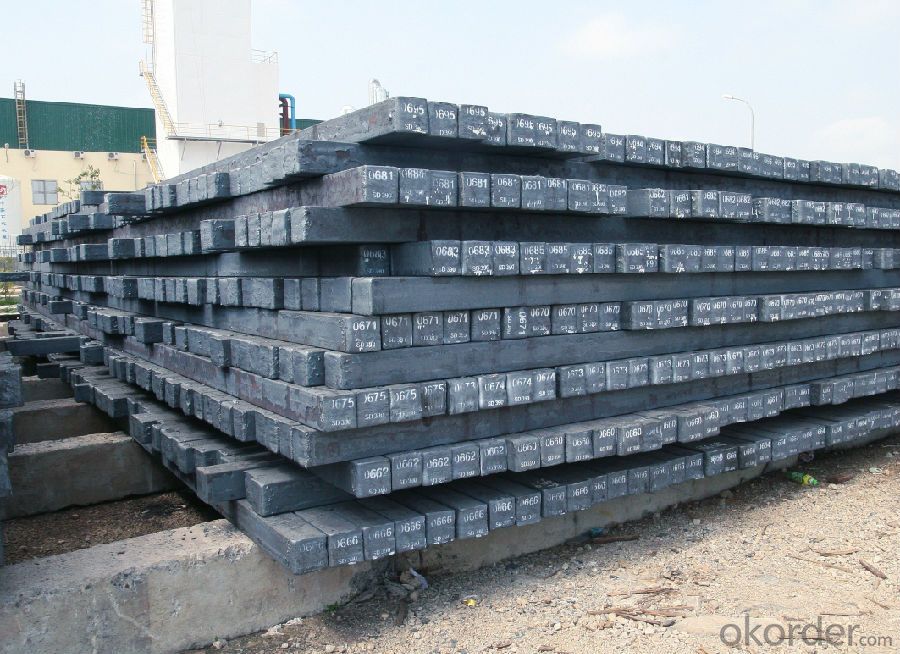
Specifications of Square Steel Billet Q235 3SP Grade Prime Quality 3#
| Standard | C(%) | Mn(%) | S(%) | P(%) | Si(%) |
| Q195 | ≤0.12 | ≤0.50 | ≤0.040 | ≤0.035 | ≤0.30 |
| Q235 | ≤0.20 | ≤1.40 | ≤0.045 | ≤0.045 | ≤0.35 |
| Q275 | ≤0.22 | ≤1.50 | ≤0.045 | ≤0.045 | ≤0.35 |
| 20MnSi | 0.17-0.25 | 1.2-1.6 | ≤ 0.050 | ≤ 0.050 | 0.40-0.80 |
| 3SP | 0.14-0.22 | 0.40-0.85 | ≤ 0.050 | ≤ 0.040 | 0.05-0.15 |
| 5SP | 0.28-0.37 | 0.50-1.00 | ≤ 0.050 | ≤ 0.040 | 0.15-0.30 |
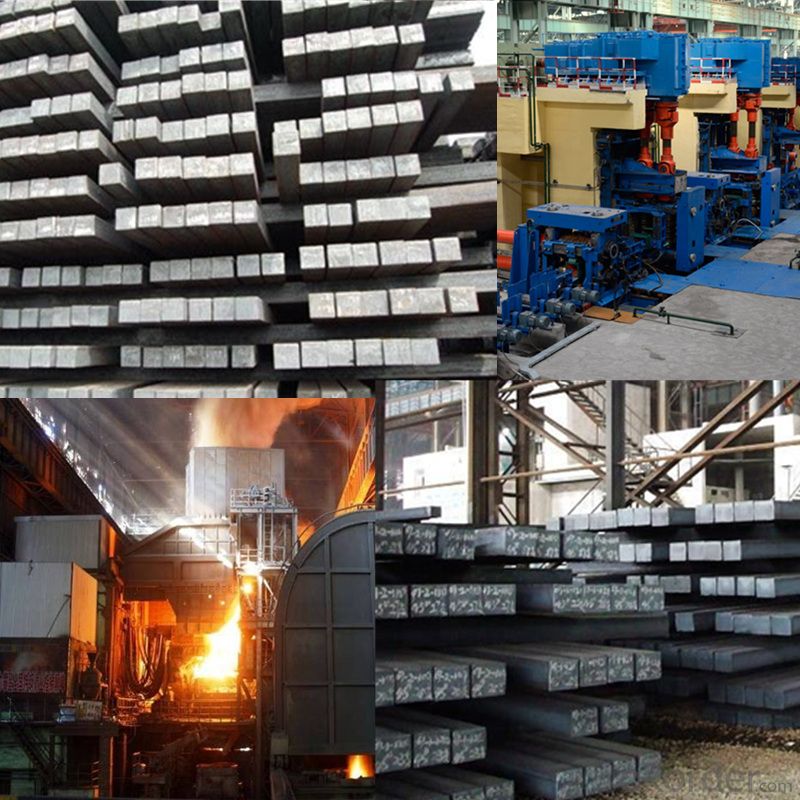
FAQ of Square Steel Billet Q235 3SP Grade Prime Quality 3#
We have organized several common questions for our clients,may help you sincerely:
1. How Can I Visit There?
Our company is located in Tianjin City, China, near Beijing. You can fly to Tianjin Airport Directly. All our clients, from home or aboard, are warmly welcome to visit us!
2. How Can I Get Some Sample?
We are honored to offer you sample.
3. Why choose CNBM?
Our delivery time about 15-20days for standard sizes, if you have other requirements like hardness, quanity and width ,it is about 20-40days. But don't worry we also try our best for the delivery time ,because time longer and our cost is higher.
- Q: How are steel billets used in the manufacturing of valves and fittings?
- Steel billets are used in the manufacturing of valves and fittings as the starting material. These billets are heated and then mechanically or forge pressed to shape them into the desired valve or fitting component. The billets provide the necessary strength and durability required for these critical components in various industries.
- Q: What are the different types of steel billet inspection techniques?
- There are several types of steel billet inspection techniques, including visual inspection, ultrasonic testing, magnetic particle testing, dye penetrant testing, and eddy current testing.
- Q: How are steel billets cut and shaped into desired forms?
- Steel billets are cut and shaped into desired forms through a process called hot rolling. The billets are heated and then passed through a series of rollers, which apply pressure and shape the steel into various profiles such as bars, rods, or sheets. This process allows for precise control over the dimensions and specifications of the final product.
- Q: How do steel billets contribute to the overall corrosion protection of a structure?
- Steel billets contribute to the overall corrosion protection of a structure by being manufactured with specific chemical compositions and surface finishes that enhance their resistance to corrosion. These billets are used to produce corrosion-resistant steel products, such as beams, columns, and plates, which are then incorporated into the structure. The corrosion resistance of these steel products helps to prevent the formation and spread of rust, ensuring the longevity and durability of the structure.
- Q: What is the typical weight of a steel billet?
- The weight of a steel billet can differ based on its size and purpose, resulting in a range of common weights between 1,000 and 5,000 pounds (450 to 2,270 kilograms). This weight range grants flexibility in manufacturing processes and enables diverse applications across industries like construction, automotive, and manufacturing. It is crucial to acknowledge that distinct weight prerequisites might vary according to the steel billet's intended use and specifications.
- Q: How are steel billets used in the manufacturing of chemical processing equipment?
- The manufacturing process of chemical processing equipment heavily relies on steel billets. These billets act as the primary material that undergoes various transformations to become the final products necessary for chemical processing plants. To begin with, steel billets are crucial for the production of high-quality steel plates. These plates form the structural framework of chemical processing equipment. They are meticulously cut, shaped, and welded together to create vessels, reactors, and storage tanks. The exceptional strength and durability of steel make it the ideal choice for containing corrosive chemicals and withstanding the extreme pressures and temperatures experienced in chemical processing. Not only that, but steel billets also play a vital role in the creation of pipes and fittings used in chemical processing plants. These billets are heated and passed through a series of rollers to form seamless or welded pipes. The resulting pipes are then subjected to further processing and fabrication to meet specific requirements such as corrosion resistance, heat resistance, and pressure ratings. Additionally, steel billets are instrumental in the manufacturing of various components of chemical processing equipment, including valves, flanges, and other fittings. These components are essential for controlling the flow of chemicals, regulating pressure, and connecting different parts of the processing system. Steel billets are machined, forged, or cast to create these components, ensuring their strength, reliability, and resistance against chemical corrosion. To sum up, steel billets are an indispensable part of the manufacturing process for chemical processing equipment. Their versatility, strength, and resistance to corrosion make them the preferred choice for constructing the structural framework, pipes, and fittings needed in chemical processing plants. By utilizing steel billets, manufacturers can guarantee the reliability, safety, and longevity of the equipment used in the chemical industry.
- Q: What are the common surface defects in steel billets during cooling?
- During the cooling process of steel billets, several common surface defects can occur. These defects can arise due to various factors such as improper handling, inadequate cooling techniques, or material impurities. Some of the most common surface defects in steel billets during cooling include: 1. Scale Formation: Scale is a thin layer of oxides that forms on the surface of the steel due to exposure to air during the cooling process. It can result in a rough and uneven surface, reducing the overall quality of the billet. 2. Cracks: Cracks can occur during cooling due to the thermal stresses induced in the steel. These cracks can be longitudinal, transverse, or even intergranular, affecting the structural integrity of the billet. 3. Lamination: Lamination defects occur when layers or sheets of steel separate from each other due to inadequate bonding during the cooling process. This can lead to weak spots in the billet and reduce its overall strength. 4. Shrinkage Cavities: Shrinkage cavities, also known as shrinkage porosity, occur when the steel solidifies and contracts during cooling, resulting in voids or cavities in the billet's surface. These cavities can weaken the steel and compromise its mechanical properties. 5. Surface Roughness: Inadequate cooling techniques can lead to uneven cooling and rapid solidification, resulting in a rough and uneven surface texture on the billet. This defect can affect the billet's surface finish and subsequent processing. 6. Decarburization: Decarburization is the loss of carbon content from the surface of the billet due to exposure to high temperatures and oxygen during the cooling process. This can lead to reduced hardness and strength in the affected areas. To minimize these surface defects, proper cooling techniques, including controlled cooling rates, use of protective coatings, and handling practices, should be implemented. Regular inspection and quality control measures are also essential to identify and rectify any defects during the cooling process and ensure the production of high-quality steel billets.
- Q: What are the different types of surface coating methods used for steel billets?
- There are several types of surface coating methods used for steel billets, including galvanizing, electroplating, powder coating, and painting. Galvanizing involves applying a layer of zinc to the surface of the billets to provide corrosion resistance. Electroplating uses an electrical current to deposit a thin layer of metal onto the steel surface, enhancing its appearance and protecting it from corrosion. Powder coating involves applying a dry powder to the billets, which is then heated to form a protective layer. Painting is another common method, where a liquid paint is applied to the billets to provide both protection and aesthetic appeal.
- Q: How do steel billets contribute to the chemical industry?
- Steel billets are an essential raw material in the chemical industry for the production of various chemicals and chemical products. These billets, which are solid bars or rods of steel, play a crucial role in the manufacturing process. Firstly, steel billets are used in the construction of reactors and vessels that are used in chemical production plants. These reactors are designed to withstand high temperatures and pressure, and steel billets provide the necessary strength and durability for these applications. The chemical reactions that take place in these reactors often involve corrosive or harsh chemicals, and the use of steel billets ensures that the equipment remains intact and prevents any leaks or accidents. Furthermore, steel billets are also used in the production of catalysts, which are substances that facilitate chemical reactions without being consumed in the process. Many catalysts are made from metals or metal oxides, and steel billets are often used as the base material for their production. By providing a stable and strong foundation, steel billets help ensure the efficiency and effectiveness of these catalysts. Additionally, steel billets are used in the construction of pipelines and storage tanks that are crucial for transporting and storing chemicals. These structures need to be able to withstand high pressures and corrosive environments, and steel billets are the preferred material due to their strength, durability, and resistance to chemical degradation. They ensure the safe and efficient transportation and storage of chemicals, which is crucial for the chemical industry. In conclusion, steel billets are indispensable in the chemical industry due to their strength, durability, and resistance to chemical degradation. They are used in the construction of reactors, vessels, catalysts, pipelines, and storage tanks, all of which are essential components of chemical production and transportation. Without steel billets, the chemical industry would struggle to operate efficiently and safely.
- Q: What is Alfa carbon? What is beta carbon?
- Alfa is directly connected with the functional groups of carbon atoms of carbon atoms, such as CH3CH2COOH CH2 in which methylene propionate is Alfa carbon carbon carbon atom is the beta carbon atom is directly connected with the functional groups and the connection of the carbon (around Kazakhstan), such as the CH3CH2COOH CH3 propionic acid methyl carbon is the beta carbon
Send your message to us
Square Steel Billet Q235 3SP Grade Prime Quality 3#
- Loading Port:
- Tianjin
- Payment Terms:
- TT OR LC
- Min Order Qty:
- 2000 m.t
- Supply Capability:
- 50000 m.t/month
OKorder Service Pledge
OKorder Financial Service
Similar products
Hot products
Hot Searches
Related keywords
